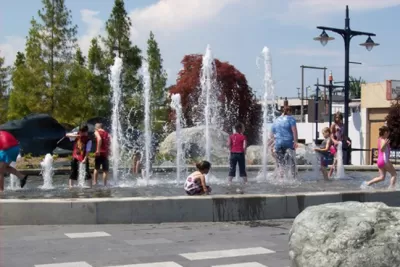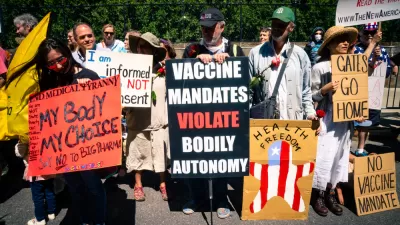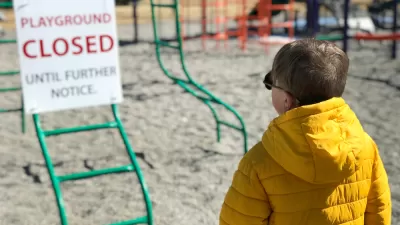The "Using Behavioral Economics to Create Playable Cities" report suggests that so much time spent in front of screens, and the continued need to counter the obesity epidemic, requires new thinking about play for children living in cities.

Rachel Dovey shares news of a report by KaBOOM about how to build "playable cities" [pdf]. The idea is presented as an alternative to traditional play areas, which are lacking or underutilized in many places.
Here's how Dovey describes the idea put forward by the report: "Instead of setting spaces aside for play, why not integrate them into the streets, sidewalks and bus stops people use every day? If the park isn’t a destination — if it’s a bus stop in the shape of the word BUS that kids can lounge, jump and slide on — then they end up playing during their daily commute. And quick-access structures integrated into city streets could both keep families from leaving for the suburbs and encourage them to bike, walk and take the bus instead of driving cars."
To make that argument, the report "delves into some of the psychological barriers that can also limit access, using a lens called 'behavioral economics' to see 'how people make decisions in a complex and textured world where details matter.'"
FULL STORY: For Family-Friendly Cities, Build Play Beyond the Playground

Planetizen Federal Action Tracker
A weekly monitor of how Trump’s orders and actions are impacting planners and planning in America.

Restaurant Patios Were a Pandemic Win — Why Were They so Hard to Keep?
Social distancing requirements and changes in travel patterns prompted cities to pilot new uses for street and sidewalk space. Then it got complicated.

Map: Where Senate Republicans Want to Sell Your Public Lands
For public land advocates, the Senate Republicans’ proposal to sell millions of acres of public land in the West is “the biggest fight of their careers.”

Maui's Vacation Rental Debate Turns Ugly
Verbal attacks, misinformation campaigns and fistfights plague a high-stakes debate to convert thousands of vacation rentals into long-term housing.

San Francisco Suspends Traffic Calming Amidst Record Deaths
Citing “a challenging fiscal landscape,” the city will cease the program on the heels of 42 traffic deaths, including 24 pedestrians.

California Homeless Arrests, Citations Spike After Ruling
An investigation reveals that anti-homeless actions increased up to 500% after Grants Pass v. Johnson — even in cities claiming no policy change.
Urban Design for Planners 1: Software Tools
This six-course series explores essential urban design concepts using open source software and equips planners with the tools they need to participate fully in the urban design process.
Planning for Universal Design
Learn the tools for implementing Universal Design in planning regulations.
Heyer Gruel & Associates PA
JM Goldson LLC
Custer County Colorado
City of Camden Redevelopment Agency
City of Astoria
Transportation Research & Education Center (TREC) at Portland State University
Camden Redevelopment Agency
City of Claremont
Municipality of Princeton (NJ)




























